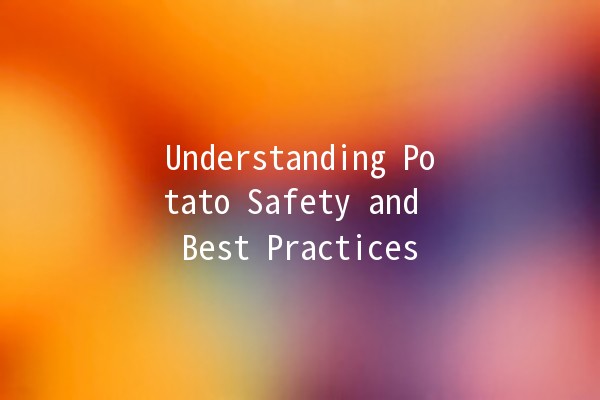to Potato Safety
Potatoes are among the most popular and versatile vegetables worldwide. They can be prepared in numerous ways—from mashed and baked to fried and roasted. However, ensuring the safety of potatoes is essential in preventing foodborne illnesses and maximizing their benefits. This article delves into the safety of potatoes, examining how to store, prepare, and consume them safely while also offering practical tips for enhancing productivity in the kitchen.
Importance of Potato Safety

Potato safety involves understanding how to handle, store, and prepare potatoes to reduce the risk of foodborne illnesses. Given that potatoes are typically grown underground, they can be contaminated with pathogens from the soil. Furthermore, improper storage or preparation can lead to spoilage and the production of harmful substances such as solanine, which occurs in green or sprouted potatoes. Awareness of these factors is crucial for anyone incorporating potatoes into their diet.
Five Key Tips for Ensuring Potato Safety and Productivity
Explanation: Storing potatoes correctly can prolong their freshness and safety. Potatoes should be kept in a cool, dark place with good ventilation, such as a pantry or a cellar. Exposure to light can promote sprouting and the production of solanine, making them toxic.
Example: For best practices, store potatoes in a breathable container like a paper bag or a basket, and avoid plastic bags that can trap moisture and lead to spoilage. Regularly check your stored potatoes for any signs of sprouting or soft spots, discarding those that are affected.
Explanation: Potatoes should be washed thoroughly before being cooked or consumed. Washing removes dirt, bacteria, and pesticides that can be present on the skin.
Example: Use a soft brush and running water to scrub the potatoes. If you’re preparing potatoes for a salad, consider rinsing them well, peeling them afterward, and ensuring that your cutting board and knife are sanitized to avoid crosscontamination.
Explanation: When potatoes turn green, it is an indication of solanine production. Consuming green potatoes can lead to nausea, headaches, and other health issues.
Example: If you find green spots on a potato, it’s best to cut away the affected areas. For heavily green potatoes, it’s safer to discard them entirely. Always store potatoes in a dark environment to prevent greening.
Explanation: Cooking potatoes thoroughly is key to eliminating harmful bacteria. The recommended internal temperature for cooked potatoes is 210°F (99°C).
Example: Regardless of the method of cooking—boiling, baking, or frying—using a food thermometer can assist in verifying that they’ve reached a safe temperature. This is especially critical for dishes that combine potatoes with other ingredients, such as casseroles or potato salads.
Explanation: Crosscontamination can occur when raw potatoes come into contact with other foods. This is particularly concerning with raw meats and seafood.
Example: Always use separate cutting boards for raw meats and vegetables. Clean all utensils and surfaces immediately after contact with raw potatoes before using them for other ingredients. This minimizes the risk of spreading bacteria.
Frequently Asked Questions
What should I do if I see that my potatoes have sprouted?
Sprouted potatoes can still be safe to eat, provided that you remove the sprouts and any green parts of the potato. Use a knife to cut away the sprouts and any green areas. If there’s extensive sprouting or mushiness, it’s best to discard the potato as it may be unpleasant to eat.
How can I tell if a potato has gone bad?
Signs that a potato has gone bad include softness, wrinkling, or a strong odor. If a potato feels mushy or has soft spots, it’s an indication of spoilage. Additionally, if there’s significant green discoloration or dark spots, it might not be safe to eat.
Is it safe to eat potatoes that have been stored for a long time?
Potatoes can last for several weeks if stored properly in a cool, dark place. However, if they have started to sprout or have been stored for months, it’s wise to inspect them closely for any spoilage. When in doubt, it’s better to err on the side of caution and discard questionable potatoes.
Can I eat the skin of potatoes?
Yes, potato skin is nutritious and can be consumed as long as it's thoroughly washed and there are no signs of greening or spoilage. The skin contains fiber and many vitamins and minerals, making it a healthy addition to your meal. If you prefer not to eat the skin, be sure to wash the potatoes well before peeling them.
How can I safely cook potatoes that will be served later, like in a potato salad?
If you’re making a dish like potato salad that will not be served immediately, cook the potatoes first and let them cool completely before combining them with other ingredients. Ensure that they are refrigerated promptly and stored at a safe temperature to minimize bacterial growth.
What types of potatoes are safer to eat raw?
Generally, it is not recommended to eat raw potatoes due to their potential toxicity and difficulty in digestion. However, certain types, such as young or new potatoes, are sometimes eaten raw in salads. Regardless of the type, be sure to wash them thoroughly before consumption and peel if desired to reduce the risk of solanine ingestion.
Understanding potato safety is crucial for anyone looking to enjoy this delicious and versatile vegetable. By implementing sound storage practices, washing potatoes properly, cooking them to the right temperature, and avoiding crosscontamination, you can safely enjoy the many benefits of potatoes. Whether you are preparing them for a family meal or experimenting with new recipes, keeping safety in mind will enhance your culinary experience.